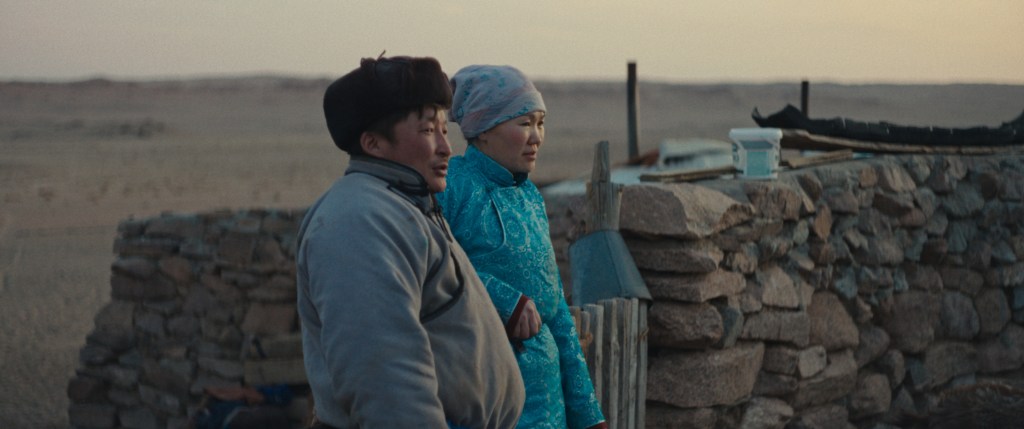Australia has selected Gabrielle Brady’s hybrid Mongolia-set work The Wolves Always Come at Night as its submission for the Best International Feature Film category at the 98th Academy Awards
The Mongolian language film will also run for consideration in the Best Documentary Feature category.
The film blends documentary and fiction to tell the dramatic and heartrending story of Mongolian herders Davaasuren Dagvasuren and Otgonzaya Dashzeveg’s difficult decision to leave their homelands after the arrival of a powerful and destructive sandstorm.
These freezing storms, known as ‘dzuds’ in Mongolia, are getting more sudden and severe as climate change accelerates. Dagvasuren and Dashzeveg are also co-writers on the film with Brady.
The film world premiered in the Toronto’s Platform competition in 2014, and also played at the BFI London Film Festival, Zurich Film Festival, IDFA, San Francisco International Film Festival, True/False, Sydney Film Festival.
The Wolves Always Come at Night is Brady’s second feature after Island of the Hungry Ghosts and is billed as the world’s first ever co-production between Australia, Germany, and Mongolia.
It is produced by Rita Walsh (The Assistant, Buoyancy), who works between the U.S. and Australia, as well as Julia Niethammer (Island of the Hungry Ghosts) at Berlin-based Chromosom Film and Ariunaa Tserenpil (City of Wind, Bedridden, Remote Control) at Guru Media, which is based in the Mongolian capital of Ulaanbaatar.
“Our beautiful international collaboration was a deeply important and enriching experience for all of us. Now, being selected by the Australian committee is a hugely special moment for our film team from Australia, but also for all of our team in Mongolia, Germany, Colombia, the UK, and the USA. It is such an honor to compete alongside so many other outstanding films,” they said in a joint statement.
Executive Producers include Oscar-winner Dan Cogan, Deanne Weir, Stefanie Plattner, Alexander Wadouh, and Emma Hindley.
The film received principal production investment from Screen Australia and significant private investment from WeirAnderson Films, alongside Storming Donkey Productions.
The Wolves Always Come at Night was also financed with support from BBC Storyville, SWR Arte, and distributor Madman Films, which launched the film in theaters in Australia over the summer. Cinephil is repping for worldwide sales.
“My hope is that our film brings audiences closely into the lives of Davaa and Zaya, who face the sudden upheaval of climate displacement, but who also find ways to resist in the face of irreversible change. As our world confronts the growing reality of climate migration, sharing this story on a global stage fills me and our whole team with immense hope and pride,” said Brady.
Co-writers and subjects Dagvasuren and Dashzeveg echoed these sentiments, saying: “We are very proud that the film has been selected in this way. We hope this will lead to more people to understand the great changes happening in our pastures and landscapes now – with global warming deeply affecting us, and so many others around the world.”
Australia has submitted films into the Best International Feature Film since 1996, with the selection made by industry professionals in a process overseen by Screen Australia.
“The Australian selection committee are unanimous in their recommendation and extremely pleased to put forward The Wolves Always Come at Night as Australia’s official submission to the Academy Awards,” this year’s committee said in a statement.
“A striking and original portrait of a family deeply affected by climate change and its devastating effects on their traditional way of life, cultural values and homeland. A significant and brilliantly crafted feature film that everyone in the committee regarded as requisite Cinema viewing.”
As of 2025, sixteen Australian films have been submitted including the Yolngu Matha and Gunwinggu language film Ten Canoes (2006); Warlpiri language film Samson and Delilah (2009), which was shortlisted, Lao language film The Rocket (2013) and Nauvhal language film Tanna (2016), which made it through to the nomination stage.
